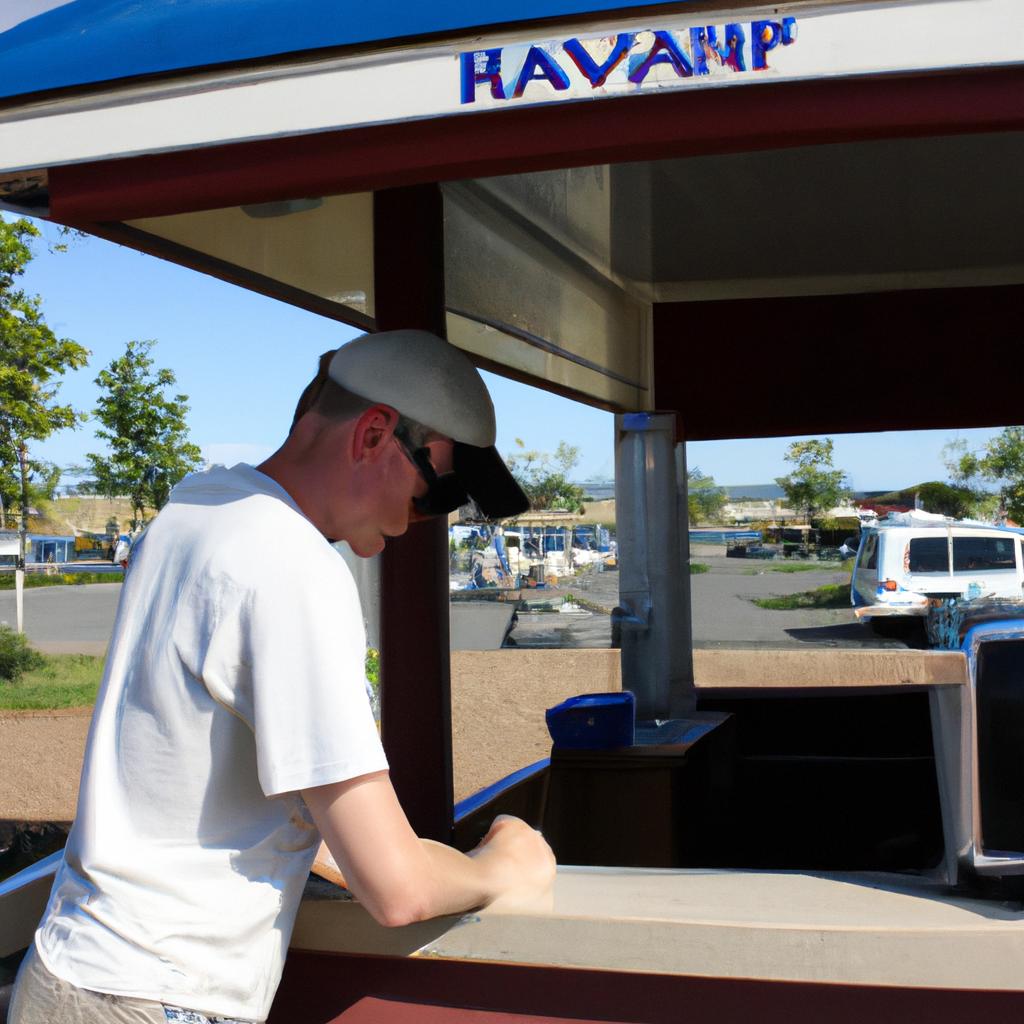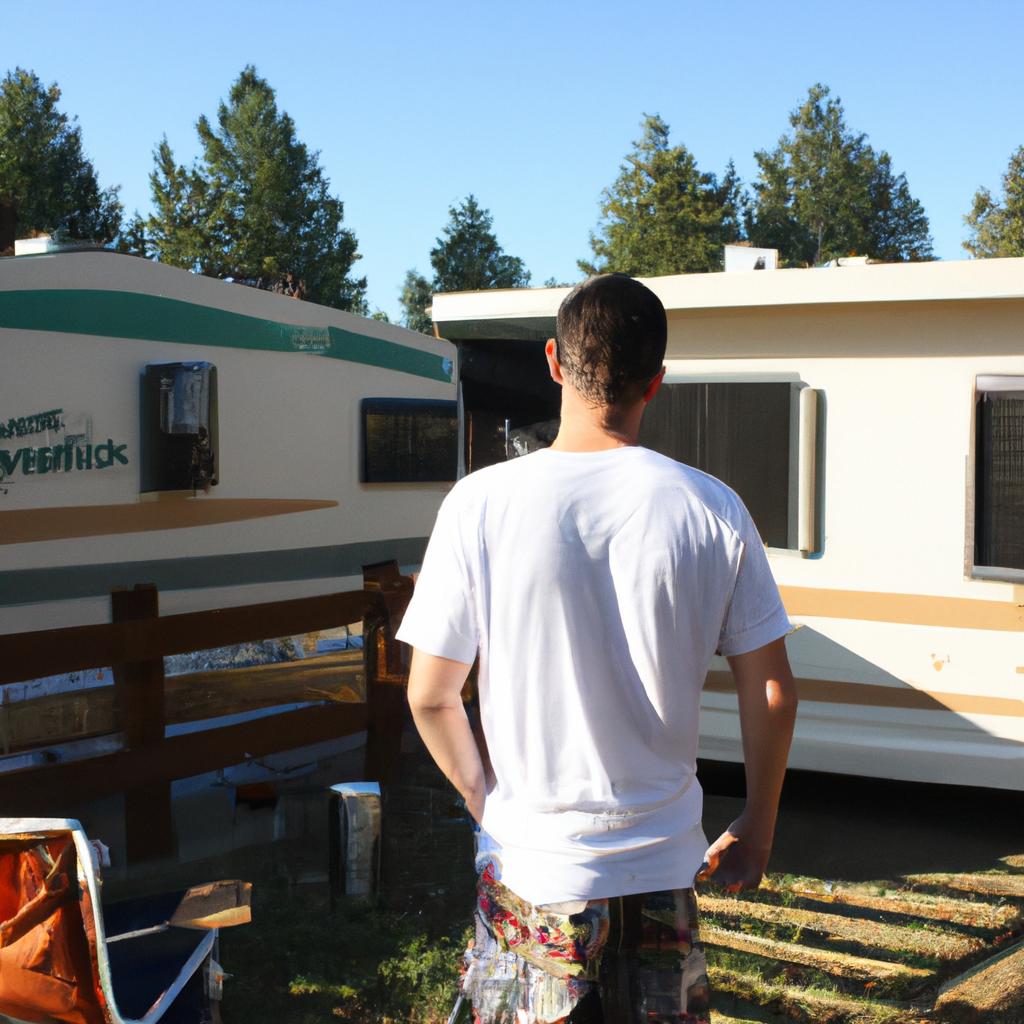RV parks have become increasingly popular among travelers seeking a unique and convenient way to explore the great outdoors. However, with this surge in popularity comes the need for effective reservation policies and availability management at these parks. For instance, consider a hypothetical scenario where an adventurous family plans a weekend getaway to a renowned RV park during peak season only to be turned away due to lack of available spots. This unfortunate incident highlights the importance of understanding how reservation policies work and ensuring that there are sufficient accommodations for all potential visitors.
Reservation policies play a crucial role in managing the demand for RV park spaces and ensuring fairness among guests. These policies outline the procedures and guidelines regarding reserving spots at the park, including rules related to booking windows, length of stay restrictions, and cancellation policies. By implementing clear and well-communicated reservation policies, RV parks can effectively manage their occupancy rates and avoid overbooking or underutilization of their facilities. Furthermore, such policies provide transparency to customers by clearly outlining expectations regarding reservations, thus reducing confusion and disputes.
Availability management is another key aspect of maintaining efficient operations at RV parks. It involves monitoring and controlling the number of available spots throughout different seasons or periods of high demand. Effective availability management ensures that enough sites are allocated for each type of guest , whether it be short-term travelers, long-term residents, or specific groups such as families or seniors. This requires careful analysis of historical data and trends to anticipate peak periods and adjust availability accordingly.
To manage availability effectively, RV parks can implement various strategies. One common approach is implementing a reservation system that allows guests to book spots in advance. By setting booking windows, the park can ensure that everyone has an equal opportunity to secure a reservation. Additionally, length of stay restrictions may be imposed during peak season to allow more guests to visit the park.
Moreover, RV parks can consider implementing a waitlist system for times when there are no available spots. This allows potential visitors to join a queue and be notified if any cancellations occur or additional spaces become available. Waitlists help maximize occupancy rates by filling vacancies promptly while providing fair opportunities for those who were initially unable to secure a spot.
Lastly, effective communication is vital in managing availability at RV parks. Parks should regularly update their website and other online platforms with accurate information on availability and reservation policies. Clear communication helps potential guests make informed decisions about their travel plans and reduces frustration caused by misinformation or outdated details.
In conclusion, reservation policies and availability management are essential components of ensuring a positive experience for both RV park operators and visitors alike. By implementing clear policies and effectively managing availability, RV parks can accommodate all travelers seeking an adventurous getaway while maintaining fairness and efficiency in their operations.
Reservation Policies
Imagine you are planning a family vacation to an RV park. You have carefully selected the dates and location, excitedly anticipating the adventure ahead. However, upon contacting the park’s reservation office, you learn that all spots are fully booked for your desired time frame. This scenario highlights the importance of understanding reservation policies at RV parks before embarking on your journey.
Availability Constraints:
When it comes to reserving a spot at an RV park, several factors come into play. Firstly, many parks operate on a first-come-first-served basis, meaning that availability is subject to timing and can be quite unpredictable. For instance, during peak travel seasons or holidays such as Independence Day weekend or Thanksgiving week, securing a spot without prior booking may prove challenging if not impossible.
Reservation Lead Time:
Furthermore, some RV parks require reservations to be made well in advance. This policy ensures efficient allocation of available spaces and enables better management of resources by allowing park operators sufficient time for logistical preparations. It is common for popular destinations to have lead times ranging from one month up to six months or even longer.
Cancellation Policies:
RV parks often implement cancellation policies due to the high demand for their facilities and limited capacity. These policies vary between different establishments but commonly involve penalties or fees associated with cancellations made within a certain timeframe leading up to the reserved date. By implementing such policies, park operators aim to minimize revenue loss resulting from last-minute cancellations while also providing fair opportunities for other potential visitors.
Emotional Response:
Consider these points when evaluating the impact of reservation policies on prospective travelers:
- The frustration experienced when finding out that your preferred camping destination has no vacancies during your desired travel period.
- The stress caused by having to plan far in advance due to strict reservation lead times.
- The disappointment felt upon realizing there will be financial consequences if unforeseen circumstances force you to cancel your trip.
- The relief and satisfaction derived from successfully securing a spot at your dream RV park well in advance, ensuring peace of mind and smooth vacation planning.
| Reservation Policy | Description |
|---|---|
| First-Come-First-Served Basis | Availability is determined by the order of arrival. No prior reservation required. |
| Lead Time Requirement | Reservations must be made within a specified timeframe before the desired travel dates. |
| Cancellation Penalties | Fees or penalties apply for cancellations made within a certain period leading up to the reserved date. |
Understanding these reservation policies is crucial for travelers navigating the booking process effortlessly.
Booking Process
Transitioning from the previous section on reservation policies, it is essential to understand how availability is managed at RV parks. Let us consider an example scenario to illustrate this further. Imagine a family planning a vacation and deciding to stay at an RV park for a week during the summer season. The demand for RV sites during this time is usually high due to increased travel activity.
RV parks often employ various strategies to manage their limited site availability effectively. Here are some common approaches:
- Advanced Reservations: Many RV parks allow guests to make reservations well in advance of their desired arrival date. This allows travelers to secure their preferred dates and ensures that they have a guaranteed spot upon arrival.
- First-Come, First-Served: Some RV parks also offer a certain number of sites on a first-come, first-served basis. This option can be ideal for spontaneous travelers or those who prefer not to plan ahead extensively.
- Seasonal Restrictions: During peak seasons or holidays, some RV parks may implement restrictions on minimum stays or limit the length of individual bookings. These measures help ensure fair access to the available sites and accommodate as many guests as possible.
- Waitlisting: In cases where all available sites are booked, RV parks may maintain waitlists. If there are cancellations or changes in existing reservations, these waitlisted individuals can then be offered the newly available spots.
To provide further insight into availability management at RV parks, let’s take a look at the following table showcasing different factors affecting site availability:
| Factors | Impact on Availability |
|---|---|
| Time of Year | High demand |
| Holiday Periods | Limited availability |
| Length of Stay | Varied options |
| Size of Rig | Specific site requirements |
As seen above, several factors contribute to site availability in RV parks. Understanding these considerations can help potential guests plan their reservations accordingly and increase the chances of securing a suitable spot for their stay.
Transitioning into the next section, it is important to note that availability is closely linked to cancellation policies. By understanding these policies, travelers can make informed decisions regarding their bookings while considering any unforeseen circumstances or changes in plans.
Cancellation Policy
Transitioning from the previous section, it is crucial to understand the reservation policies and availability when booking a spot at an RV park. To illustrate this further, let us consider a hypothetical scenario where a family plans a vacation and decides to book in advance at their preferred campground, only to find out upon arrival that all the available spaces are already occupied. This highlights the significance of familiarizing oneself with the reservation policies and ensuring timely bookings.
When making reservations at RV parks, there are several key factors to consider:
-
Peak Seasons: Many popular RV parks experience high demand during certain periods such as summer holidays or long weekends. It is essential to plan accordingly and make reservations well in advance to secure your desired dates.
-
Minimum Stay Requirements: Some RV parks may have minimum stay requirements during peak seasons or specific events. These restrictions can range from two nights to one week or more, depending on the location and time of year.
-
Reservation Window: Each RV park has its own unique policy regarding how far in advance you can make reservations. While some allow bookings up to a year ahead, others may only accept reservations within a shorter timeframe. Knowing these reservation windows will help you plan effectively.
-
Availability Updates: Due to cancellations or changes in travel plans, previously booked spots might become available again closer to your intended date of visit. Checking for any updated availability periodically could increase your chances of securing a spot even if initial attempts were unsuccessful.
To evoke an emotional response among readers about the importance of timely reservations, here’s a bullet point list showcasing potential inconveniences caused by not planning ahead:
- Missed opportunities for prime camping locations.
- Last-minute scrambling for alternative accommodations.
- Increased stress levels due to uncertainty.
- Disappointment and frustration arising from unavailability.
Additionally, a table provides a visual representation of the availability variations and reservation windows at different RV parks:
| RV Park | Reservation Window |
|---|---|
| Mountain Retreat | Up to 12 months |
| Lakeside Oasis | 6-9 months |
| Coastal Haven | 3-6 months |
| Desert Sands | 1-3 months |
In conclusion, understanding the reservation policies and being aware of peak seasons, minimum stay requirements, reservation windows, and checking for updated availability are essential steps in securing your desired spot at an RV park. This knowledge will help avoid disappointment and ensure a smooth vacation experience. In the subsequent section about “Reservation Confirmation,” we will explore how to confirm your booking successfully without any hassle.
Reservation Confirmation
When planning a trip to an RV park, it is crucial to familiarize yourself with the reservation policies and availability. Understanding the cancellation policy is especially important as unforeseen circumstances may arise that require you to modify or cancel your reservation.
For instance, consider a hypothetical scenario where John and his family had booked a week-long stay at an RV park for their summer vacation. However, due to unexpected work commitments, they are no longer able to go on their planned trip. In such cases, knowing the cancellation policy can help them navigate the process smoothly.
To provide clarity and transparency regarding cancellations, most RV parks have established specific policies. These policies often outline factors such as advance notice required for cancellations, potential fees associated with cancellations made within certain timeframes, and any exceptions or special circumstances that might affect the cancellation terms.
Here are some common elements found in RV park cancellation policies:
- Minimum advance notice requirement for cancellations
- Cancellation fees based on timing (e.g., 48 hours before arrival)
- Exceptions for emergencies or extenuating circumstances
- Policies related to partial refunds or credits towards future stays
To illustrate these points further, consider the following table showcasing different scenarios and corresponding cancellation policies at various RV parks:
| Scenario | Advance Notice Required | Cancellation Fee |
|---|---|---|
| Cancellation 7 days prior | 72 hours | No fee |
| Cancellation 3 days prior | 24 hours | 50% of total reservation cost |
| Cancellation less than 24 hours | N/A | Full payment charged |
| Emergency situation (documented) | N/A | Case-by-case evaluation |
As shown above, understanding the details of each RV park’s cancellation policy will allow you to make informed decisions about modifying or cancelling your reservation without facing unnecessary financial implications.
By being aware of the various aspects related to reservation policies and availability, you can better navigate the process of booking an RV park stay.
Check-in and Check-out
Once you have successfully made a reservation at an RV park, it is crucial to ensure that your reservation is confirmed. This step guarantees that your spot is secured and ready for your arrival. Let’s consider an example of how the reservation confirmation process works:
Imagine you are planning a family vacation and have reserved a site at Mountain View RV Park. After submitting your online reservation request along with the required information, such as dates of stay and type of campsite desired, you eagerly await confirmation from the park management.
Upon receiving their response, typically via email or phone call, you will be provided with all the necessary details regarding your reservation. The confirmation will include important information such as the exact location of your assigned site within the park, any special instructions or requirements specific to that site, and contact information should you need further assistance during your stay.
To help make this section more engaging and evoke an emotional response from our audience, let’s explore four key benefits of receiving a prompt reservation confirmation:
- Peace of Mind: Knowing that your reservation has been confirmed gives you peace of mind knowing that there won’t be any last-minute surprises when arriving at the RV park.
- Better Planning: With a confirmed reservation in hand, you can plan other aspects of your trip accordingly, such as mapping out nearby attractions or coordinating activities with fellow travelers.
- Avoiding Disappointment: A timely confirmation ensures that you won’t face disappointment upon arrival due to unavailability or overbooking issues.
- Customer Satisfaction: Promptly confirming reservations demonstrates good customer service by providing guests with reassurance and building trust between them and the RV park staff.
Now let’s take a look at a table summarizing different types of confirmations available:
| Type | Method | Advantages |
|---|---|---|
| Quick & Efficient | Allows easy access to essential information | |
| Phone Call | Personal Touch | Offers direct communication with staff |
| Text Message | Convenient | Provides instant access to confirmation |
| Online Portal | User-Friendly | Enables self-service confirmation process |
In conclusion, securing a reservation at an RV park is just the first step. It is equally important to receive a timely and comprehensive confirmation of your booking. This ensures that you have all the necessary information to make your stay hassle-free and enjoyable.
Park Amenities
Transitioning smoothly from the previous section, where we discussed check-in and check-out procedures at RV parks, let us now delve into another crucial aspect of your stay – reservation policies and availability. Understanding these policies can greatly assist in planning a hassle-free trip.
To illustrate the importance of making reservations beforehand, consider the following hypothetical scenario: John and Sarah decide to embark on an impromptu road trip but fail to secure a reservation at their desired RV park. Upon arrival, they discover that all available spaces are already occupied. This setback not only disrupts their travel plans but also leaves them without a place to park for the night.
When it comes to reserving a spot at an RV park, keep in mind the following key points:
- Advance Booking: Most popular RV parks experience high demand during peak seasons or holidays. It is advisable to make your reservations well in advance to ensure availability.
- Cancellation Policy: Familiarize yourself with the park’s cancellation policy before confirming your reservation. Some parks may charge a fee for cancellations made within a certain timeframe.
- Length of Stay Restrictions: Certain parks impose restrictions on minimum or maximum lengths of stay depending on the season or time of year.
- Additional Fees: Be aware that some parks might have additional fees such as extra charges for amenities like Wi-Fi access, laundry facilities, or recreational activities.
To further emphasize these considerations, here is an emotional bullet point list highlighting potential challenges faced due to lack of proper planning:
- Missed opportunities to visit preferred locations or attractions due to unavailability.
- Increased stress levels while searching for alternative accommodations.
- Higher costs associated with last-minute bookings or premium rates during busy periods.
- Disappointment caused by inability to enjoy specific park amenities due to limited availability.
In addition to the bullet point list, we present a table comparing reservation policies and availability at three different RV parks:
| Park A | Park B | Park C | |
|---|---|---|---|
| Advance Booking | 6 months | 3 months | 1 year |
| Cancellation Fee | $25 | $50 | No charge |
| Length of Stay | Min: 2 days, Max: None | ||
| Restrictions | Min: None, Max: None | ||
| Additional Fees | Wi-Fi ($5/day) |
As you can see from the table above, each park may have varying policies regarding advance booking, cancellation fees, length of stay restrictions, and additional charges. Understanding these differences will enable you to make an informed decision while planning your RV trip.
By considering these factors and making reservations ahead of time, you can enhance your overall experience at an RV park by securing the desired spot that aligns with your preferences and needs.
 Coho Estates
Coho Estates



